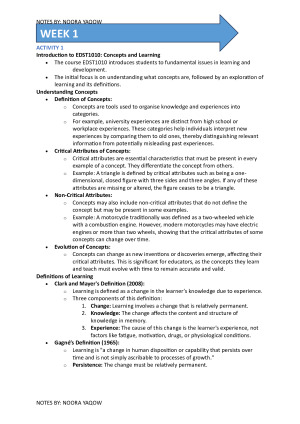EDST1010 NOTES WEEK 1-8
Subject notes for UNSW EDST1010
Description
1. Concepts of Learning: Definitions and attributes of learning. Definitions by Clark and Mayer, Gagné, Ambrose et al., and Bingham and Conner. Understanding changes in knowledge, experience, and memory. 2. Child Development: Definitions and domains of child development (physical, cognitive, social, emotional). Developmental theories by Woolfolk, Margetts, and others. 3. Learning Theories: Overview of behavioral, cognitive, humanistic, and systems theories. Contributions of key figures like Pavlov, Watson, Skinner, Thorndike, Piaget, Vygotsky, Bandura, Maslow, and Rogers. Classical vs. Operant conditioning. 4. Cognitive Development: Piaget’s stages of development (sensorimotor, preoperational, concrete operational, formal operational). Vygotsky’s socio-cultural theory, Zone of Proximal Development, and scaffolding. Information processing theories (memory models, encoding, and attention). 5. Socio-Cultural and Social Cognitive Theories: Role of culture and interaction in learning. Bandura’s theory of observational learning and self-efficacy. 6. Memory and Information Processing: Modal model of memory (sensory memory, working memory, long-term memory). Attention (selective, sustained, divided). Development of memory strategies. 7. Study Strategies: Effective and less effective study methods (practice testing, spaced learning, interleaving, summarization). Metacognitive control and its role in learning. 8. Language Development: Early childhood, primary school, and secondary school language development (syntax, morphology, phonology, semantics, pragmatics). Vocabulary growth, language use, pragmatics, and metalinguistic skills.
UNSW
Term 2, 2024
54 pages
18,000 words
$39.00
